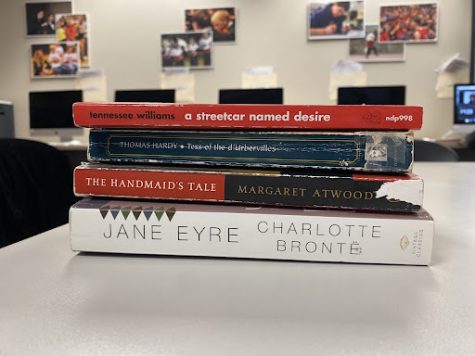Reading With a Purpose
EHS English teachers share the methodology behind assigning texts in comparison to choice reading.
Assigned reading impacts the lives of EHS students almost every day, and a substantial amount of time is spent–in and out of class–reading assigned texts. Students are regularly graded on their ability to understand the texts that they themselves did not choose. Most of the time, they are reading a text with no explanation as to why that text has been chosen. Even though the assigned reading may seem insignificant, there is an enormous amount of consideration that goes into the books, starting with how teachable a book is.

Christine Avery, an Honors English 10 teacher, believes that a book needs to allow teachers to add something to a student’s reading experience.
“As a teacher, you have to have something to offer kids,” said Avery. “If it is just [a book] that they could read on their own and completely understand it, then there is no point really in doing it as a class.”
How a book is taught affects the way it is perceived by students. In high school, AP Language and Composition teacher James Proctor did not even finish Great Expectations because of how disconnected he felt from the book.
“I could not connect with it at all, and my teacher did not really help us understand it and connect with it,” Proctor recalled. “It was just a lot of reading and then quizzes and then that was it. I did not see the purpose behind it.”
The literary merit of a book and how teachable it is often are intertwined. To English Coordinator Doug Cole, the literary merit or academic value of an assigned book outweighs the entertainment value of a book. “Really, we should be using books as tools to teach the skills. If we are only teaching a book because we like that book, that is not the right reason,” said Cole.
That said, Cole also recognizes the importance of students enjoying what they are reading. “For a lot of students, once reading is assigned, it becomes a chore. There is just this immediate resistance to wanting to read it,” he said.
There are statistics that demonstrate the disengagement influenced by assigned reading outside of the classroom, like summer reading. “There is actually a lot of research that suggests when an assignment is attached to reading, the value of the reading diminishes,” said Cole. “This was something that really helped guide our decision-making roughly four years ago, when we eliminated the summer reading assignment.”
Because of these studies, some teachers have leaned more toward choice reading. There are still significant drawbacks to choice reading, like the struggle to find the right fit. “Kids might not be informed enough to choose books that are going to help them and they are going to choose books that are too difficult,” Avery said. “It would be like me saying ‘Well, I am going to study calculus more.’ I am not going to understand it no matter how much I study it.”
Reading program director Kathryn Wells has the same opinion as Avery regarding choice reading and mentioned teachers who believe students can read without guidance. “There is no causal relationship between reading time and reading level,” said Wells. “I want [students] to develop a love of reading, but I think that is hard to do with choice books. Because I have not read every single book that the students select for choice novels, I wouldn’t be able to provide the instruction necessary to ensure growth.”
Unlike Wells and Avery, Proctor believes that students reading in general is beneficial. “Reading in general is great, you know? I tell my kids, if you are not reading, you are kind of choosing to be illiterate,” said Proctor.

While teachers may have different views on choice reading, there was an overall consensus that assigned reading has the ability to grow students’ love for literature in some capacity.
Wells discovered that assigned reading can initiate meaningful conversations between students. It is much harder for students to connect through literature when they are reading different types of books. “I have my students read their books together,” Wells said. “It is important to me that they learn to both read and discuss texts like a reader does, so they have some conversation starters that are authentic to what happens in real book groups.”
But assigned reading doesn’t just start meaningful conversations; Proctor finds that assigned reading exposes students to new genres and topics that they normally would not be exposed to. “I think [assigned reading] brings up issues and different kinds of writing that are important to talk about in class,” said Proctor. “I think it is good to sometimes push yourself with topics or to push yourself with complexity. It is okay not to like a book, but you can still get something out of it.”
Students finding books that are both interesting and appropriate is integral to building their enjoyment of reading,regardless of if what they are reading is assigned or not.
Cole believes that assigned reading brings out strengths and weaknesses within students’ already established reading skills. “I think for students who already have a love of reading, being exposed to new texts that they may not have read before can foster that love,” said Cole. “For students who do not inherently love reading and have maybe struggled with reading throughout their lives, I think it stifles them [wanting to read] because it is a reminder for them of some of their struggles.”
Even with a variety of reading levels, Cole is optimistic that all students can enjoy what they are assigned to read. “If you find the right book and you find the right student, it can be the perfect marriage,” Cole said.
Though what is considered when assigning books is not obvious to students, there is clearly work going into finding the right books. Assigned reading and choice reading have their place in an English classroom, with there being a number of pros and cons for both types. Hopefully assigned and choice reading can continue to foster the love of reading for students as well as develop the skills needed to be successful in an academic setting.

Georgia Lujan is a Senior and the editor-in-chief in her second year on staff. She enjoys writing feature and entertainment stories, especially when Taylor...






